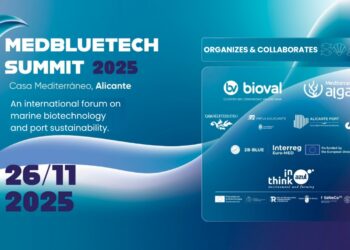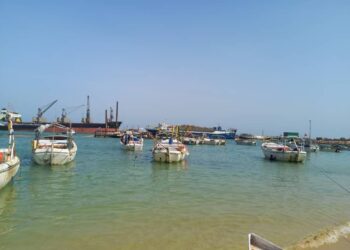Abir Gharbi Empowering Coastal Communities and Shaping a Sustainable Mediterranean Blue Economy
Sustainable management of the world’s oceans and coastal resources is more important than ever as communities face growing environmental and economic challenges. Across the Mediterranean region, experts are working to balance the needs of people, ecosystems, and economies through innovative approaches in fisheries, aquaculture, and marine conservation. Among these changemakers is Abir Gharbi, whose dedication and expertise are helping to shape a sustainable and resilient future for the blue economy.
Abir Gharbi is a fisheries and environmental engineer deeply committed to advancing sustainable ocean solutions. Her expertise spans fisheries management, aquaculture, and emerging fields such as fish welfare and blue-food systems. Through her active involvement in national and regional initiatives—including the AFIWEL Fellowship, the ECOP network, and research focused on invasive species and aquaculture development in Tunisia—she strives to foster a more sustainable and resilient blue economy for both her country and the broader Mediterranean region.

Early Passion Rooted in Coastal Life
Abir’s passion for the ocean began early in life, growing up near the sea and witnessing firsthand the profound dependence of coastal communities on marine resources. Over time, she observed increasing pressures on fisheries, from overexploitation to the impacts of climate change, which sparked her realization that science and policy have a vital role in improving the livelihoods of these communities. This insight inspired her to pursue a career dedicated to bridging ecological science with practical, sustainable solutions that benefit both coastal populations and marine ecosystems.
Strong Academic Foundations and International Exposure
Her engineering education at INAT provided her with a solid scientific and technical foundation in fisheries management, stock assessment, aquaculture systems, and environmental monitoring. This training equipped her with an analytical approach and a deep understanding of the local ecosystem challenges facing Tunisia. Later, at the University of Trieste, Abir gained exposure to European perspectives on marine conservation, blue growth, and international ocean governance. This blend of national context and international experience strengthened her conviction that sustainability depends on strong local knowledge aligned with global best practices.

A Science-Based, Ecosystem-Aware Approach
Abir’s approach to her work is science-based, ecosystem-aware, and attentive to social and economic dimensions. She chose fisheries and aquaculture because they lie at the intersection of food security, livelihoods, biodiversity, and climate resilience. Unlike many other environmental fields, fisheries management delivers immediate and visible impacts—decisions directly affect communities, markets, and ecosystems. This immediacy appealed to her desire to see scientific research translate rapidly into real-world solutions, particularly in Tunisia, where the marine sector plays a crucial economic role.
Notable Contributions and Initiatives
Among her notable contributions is her analysis of blue crab production in southern Tunisia (Médenine and Gabès). The invasive blue crab species, once seen as a threat, became an economic opportunity, and Abir’s work assessing production trends from 2017 to 2023 has helped inform effective management strategies. Additionally, she led efforts under the AFIWEL Fellowship to produce Tunisia’s first Fish Welfare Situational Analysis. This pioneering report supports improved aquaculture practices, fosters international cooperation, and promotes the One Health principles—a relatively new but significant topic within Tunisia’s fisheries landscape.
The Importance of International Cooperation
Abir emphasizes that international cooperation is essential. The Mediterranean is a shared sea where fish stocks migrate across borders, climate impacts are regional, and environmental challenges transcend national boundaries. Collaborative efforts in research, monitoring, governance, and capacity building are crucial because no single country can achieve sustainability on its own. Regional initiatives, such as the General Fisheries Commission for the Mediterranean (GFCM) and the Food and Agriculture Organization (FAO), as well as networks like ECOP, help harmonize these efforts, enabling knowledge and innovation to flow freely. For Tunisia, such cooperation bolsters scientific capacity, supports policy development, and opens doors to sustainable blue growth.
Valuable Lessons from Tunisia’s Experience
Tunisia’s experience offers valuable lessons: adaptability in turning the invasive blue crab from a threat into an economic resource; community involvement, particularly the role of artisanal fishers in monitoring and adapting to changes; aquaculture expansion through diversification of shellfish, marine finfish, and integrated systems; and ongoing policy evolution to modernize regulations and embed sustainability principles. These examples illustrate how flexible, community-centered approaches enable coastal nations to respond quickly and effectively to environmental and economic challenges.
Overcoming Challenges as a Woman in Marine Science
Like many women in marine and technical fields, Abir has faced obstacles, including limited representation, gender stereotypes, and the need to continually prove her competence. She overcame these barriers through lifelong learning, mentorship, and active participation in empowering networks such as AFIWEL and ECOP, which support young professionals and women in ocean-related careers. From her experience, she underscores the importance of visibility, confidence, and strong professional communities in overcoming challenges.
Advice for Emerging Ocean Professionals
Abir’s advice to emerging ocean professionals is clear: stay curious, stay committed, and stay connected. The ocean sector is rapidly evolving—from climate change adaptation to blue-food innovation and digital monitoring tools. Young professionals should build solid scientific expertise while embracing collaboration and multidisciplinary thinking. Most importantly, she urges not to wait for permission to contribute; even small projects, volunteer efforts, or grassroots initiatives can spark real change. The ocean needs passionate voices, and every contribution matters.
Abir Gharbi Empowering Coastal Communities and Shaping a Sustainable Mediterranean Blue Economy






